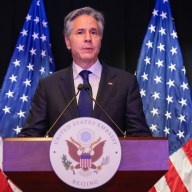BANGKOK – Thousands of Thai troops pushed anti-government protesters who rampaged throughout the capital into their stronghold Monday night, but the political unrest turned deadly when nearby residents turned against them.
The evening gunbattle came after a full day of clashes between the protesters – who are pressing Prime Minister Abhisit Vejjajiva to resign – and soldiers across the city. Troops fired warning shots and tear gas at the demonstrators and finally forced most to retreat to their base outside the prime minister’s offices.
There organizers said the group, which is made up largely of supporters of ousted prime minister Thaksin Shinawatra, would make its “final stand.”
Two people died in clashes between protesters and city residents enraged at their violent disruption. More than 100 people were injured in the more than 12 hours of running street battles – a major escalation of the country’s ongoing political turmoil.
The unrest caused malls and shops to shutter, and official celebrations for the Thai new year were cancelled. More than a dozen countries, including Canada, issued travel warnings urging citizens to avoid trips to Thailand and for those already in Bangkok to stay in their hotels and away from the protests.
As evening fell, some of the 6,000 troops deployed in Bangkok began moving toward Government House, where the protesters have been holding out since March 26. An estimated 5,000 demonstrators were gathered in the area.
But as protesters retreated, street fighting broke out in several neighbourhoods between them and residents angry at their disruption.
The deaths occurred at a market near the protesters’ stronghold, which is outside the prime minister’s offices, said government minister Sathit Wongnongtoey. Dr. Chatri Charoenchivakul of the official Erawan Emergency Co-ordination Center said the victims were males, aged 19 and 53.
He said 133 people in total had been hurt Monday.
The 53-year-old dead man, an area resident, was in a crowd of people who were hurling abuse at the protesters, who then shot at them, said Sathit. His account could not be independently confirmed.
Clashes erupted earlier between protesters and residents in at least three other areas earlier.
In a Muslim-dominated neighbourhood, hundreds of protesters threw objects at residents, burnt tires, barged into a mosque and tried to set food stalls on fire. Residents fought them with sticks.
Earlier, the protesters were stationed at a half-dozen points in Bangkok, defying government-imposed state-of-emergency measures that ban gatherings of more than five people.
Protesters commandeered public buses to block several key intersections and sent two unmanned buses, one of them burning, hurtling toward lines of soldiers. One swerved and then ricocheted off trees on the side of the road before coming to a halt, with no one injured.
In one of several confrontations, a line of troops in full battle gear fired volleys of M-16 fire, most of it aimed above the heads of protesters and turned water cannons on the crowd near Victory Monument, a major traffic circle. An army spokesman said troops fired blank bullets into the crowds and live shots overhead.
The violence threatens to slash tourism revenue and could lead to the loss of 200,000 jobs in the industry that directly employs about two million people, said Kongkrit Hiranyakit, chairman of the Tourism Council of Thailand.
It is also likely to give pause to foreign businesses considering building factories or making other investments – especially since it comes just months after a group of rival protesters occupied the capital’s airports for a week, stranding thousands of tourists and businessmen and sending the economy into a tailspin.
Political tensions have simmered since Thaksin was ousted by a military coup in 2006 amid accusations of corruption and abuse of power. He remains popular in the impoverished countryside for his populist policies.
His opponents – many in urban areas – took to the streets last year to help bring down two governments led by his allies.
















